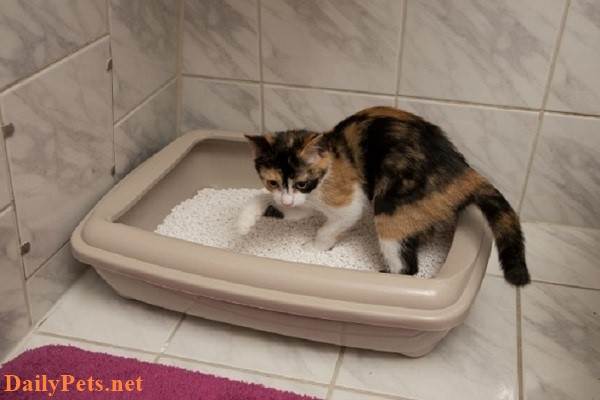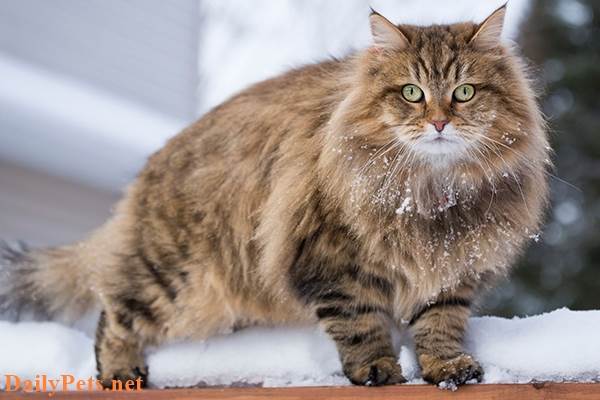Diarrhea can have a negative impact on the cat’s health and well-being. In this article, we will learn about the causes, symptoms, and treatment of diarrhea in cats.

Cat diarrhea.
Causes of Diarrhea in Cats:
Inappropriate Food Types
One of the primary causes of diarrhea in cats is consuming inappropriate types of food. Cats can develop diarrhea from eating foods that contain toxins or are difficult to digest. Inappropriate food types may include spoiled, dog, or improperly prepared human food.
Spoiled food can contain bacteria, fungi, and other toxic substances that can harm the cat’s digestive system. Additionally, some dog foods may not be suitable for cats as they contain components that are hard to digest or do not meet the nutritional requirements of cats. Human food can also lead to diarrhea in cats if it contains spices, preservatives, or dietary fiber that their digestive system cannot handle.
Diarrhea can cause discomfort for cats and may lead to dehydration, which can result in severe fluid loss and electrolyte imbalances. If diarrhea persists or worsens, it can lead to debilitation and pose a danger to the cat’s life.
Pet owners should be cautious in selecting cat food to prevent diarrhea due to inappropriate food. High-quality cat food formulated to meet all nutritional requirements and tested for safety should be chosen. Additionally, spoiled or unsuitable human food should not be given to cats. If a cat shows signs of diarrhea, it is essential to consult a veterinarian for a timely diagnosis and treatment.
Infections and Bacteria
Infections and bacteria are common causes of diarrhea in cats. Infections occur when bacteria, viruses, or fungi invade a cat’s body. Bacteria can also cause infections in the cat’s digestive system.
One common source of infection in cats is spoiled food. Cats may consume spoiled food that contains disease-causing bacteria. When cats ingest such food, the bacteria come into contact with their digestive system and can cause infection, leading to diarrhea.
Contaminated drinking water can also be a source of infection for cats. If a cat drinks water from improperly sanitized sources or water contaminated with bacteria, it can lead to gastrointestinal infections.
Moreover, cats can become infected through contact with other cats that are ill. If a cat with diarrhea interacts with healthy cats, bacteria can be transmitted from the sick cat to the healthy ones, causing infection and diarrhea.
Maintaining proper hygiene is crucial to prevent infections and bacteria-related diarrhea in cats. Ensure that the cat’s food is always fresh and not spoiled. Provide clean and uncontaminated drinking water. Limit contact between sick cats and healthy ones to avoid transmission.
If your cat experiences prolonged diarrhea or show signs of infection, consult a veterinarian for a diagnosis and proper treatment.
Symptoms of Diarrhea in Cats:
When your cat has diarrhea, there are several symptoms you may observe:
Acute Diarrhea
Acute diarrhea is a common medical condition in cats, characterized by symptoms such as loose stools, frequent bowel movements, and rapid weight loss. When afflicted with acute diarrhea, cats may become weak and lose energy.
Various factors can cause acute diarrhea. One of the most common is a bacterial or viral infection in the cat’s digestive system. Bacteria like Salmonella and Campylobacter, as well as viruses such as calicivirus and parvovirus, can cause inflammation of the intestines and diarrhea in cats.
Other factors, such as Clostridium difficile, tapeworms, and E. coli, can also contribute to acute diarrhea in cats. Changes in diet or improper medication use can also lead to acute diarrhea.
To diagnose and treat acute diarrhea in cats, taking the cat to a veterinarian is essential. The veterinarian will perform a clinical examination and may request stool or blood tests to determine the exact cause of the diarrhea.
Treatment for acute diarrhea typically includes addressing fluid loss and adjusting the cat’s diet. The veterinarian may administer fluids intravenously to prevent excessive fluid loss and provide necessary minerals. Additionally, changing the diet by offering easily digestible food or specialized nutritional products may be recommended.
In severe cases, cats may need to be hospitalized and closely monitored. The use of antibiotics or anti-diarrheal medications may also be employed to control infection and alleviate symptoms.
However, to prevent acute diarrhea in cats, it is essential to maintain good hygiene and proper nutrition for your cat. Ensure that the cat is fully vaccinated and limit exposure to sources of infection to reduce the risk of acute diarrhea.
Chronic Diarrhea
Chronic diarrhea is a prolonged condition in which diarrhea persists over an extended period. In cats, it can manifest in two main forms: sequential diarrhea and irregular loose stools.
In the case of sequential diarrhea, cats will pass loose stools frequently, often on a daily basis, for an extended period. Cats may experience discomfort and nausea when suffering from diarrhea and may even lose weight due to fluid loss and inadequate nutrition.
In the case of irregular loose stools, cats may have intermittent diarrhea mixed with normal or hard stools. Typically, cats will feel discomfort and fullness when dealing with hard stools, while diarrhea provides relief by relieving pressure in the intestines.
The severity of chronic diarrhea symptoms may vary from case to case. Some cats may only experience mild abdominal discomfort and occasional diarrhea, while more severe cases can result in significant diarrhea, rapid dehydration, and malnutrition.
The causes of chronic diarrhea in cats can include inflammatory bowel disease, infections, food allergies, digestive disorders, or other health issues. A visit to the veterinarian is necessary to diagnose and treat chronic diarrhea. The veterinarian will evaluate the cat’s symptoms and medical history and may request additional tests to make an accurate diagnosis and prescribe appropriate treatment, such as anti-diarrheal medications or dietary adjustments.
Ensuring that your cat receives adequate water and nutrition, maintaining proper cleanliness, and adhering to the veterinarian’s treatment plan are crucial to supporting recovery and controlling chronic diarrhea symptoms.
Treatment of Diarrhea in Cats:
Dietary Adjustments
One of the simplest ways to treat diarrhea in cats is to make dietary adjustments. Provide your cat with a diet rich in fiber and easy to digest. Limit the cat’s consumption of inappropriate or allergenic foods that can irritate the digestive system. Ensure your cat always has access to clean, uncontaminated drinking water to prevent dehydration.
Use of Antibiotics
In cases of diarrhea caused by bacterial infection, antibiotics may be necessary. However, the use of antibiotics should be prescribed and administered under the guidance of a veterinarian.
Supplementation of Digestive Enzymes
Sometimes, cat diarrhea can stem from an imbalance of digestive enzymes in the intestines. The cat’s intestines contain various bacteria and digestive enzymes that aid in breaking down food and absorbing nutrients. When this balance is disrupted, the cat’s digestive process can be affected, leading to diarrhea.
Supplementing digestive enzymes can be an essential supportive method to maintain intestinal balance. Digestive enzyme supplements in cat care products contain digestive enzymes and beneficial bacteria that help balance the cat’s gut microbiota. Digestive enzymes enhance the digestion of food, helping the cat absorb nutrients more efficiently.
Supplementing digestive enzymes can also strengthen the cat’s gut immune system. Beneficial bacteria in digestive enzyme supplements compete with harmful bacteria, maintaining a healthy intestinal environment. This can reduce the risk of infection and inflammation in the intestines.
Before supplementing digestive enzymes for your cat, consult your veterinarian. They can assess your cat’s health and advise you on the most suitable digestive enzyme product. Additionally, it’s important to note that digestive enzyme supplementation is only a supportive method and cannot replace a proper diet and professional medical treatment if your cat has severe diarrhea.
Conclusion:
Diarrhea is a common health issue in cats and can negatively impact their daily lives. Inappropriate food, infections, bacterial imbalances, or other health issues can cause it. To treat diarrhea in cats, adjustments in diet and the use of helpful medical methods are necessary. However, if symptoms do not improve or recur, consult a veterinarian for guidance and accurate treatment.





